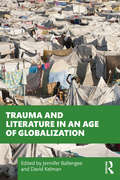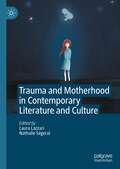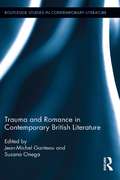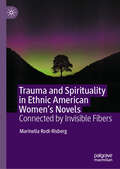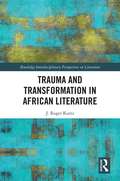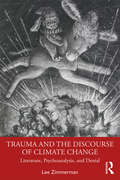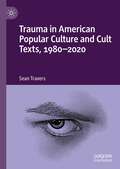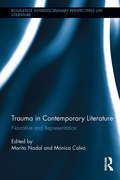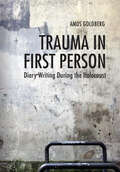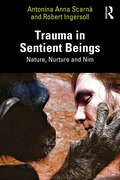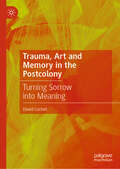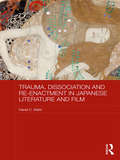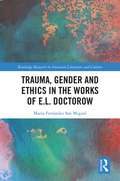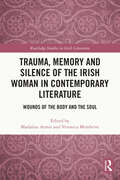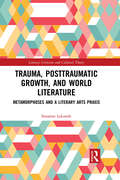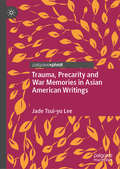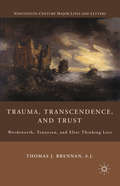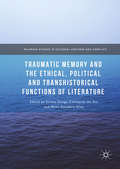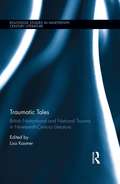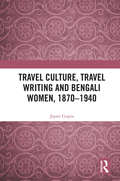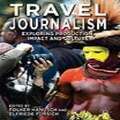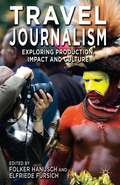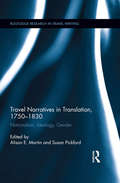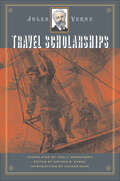- Table View
- List View
Trauma and Literature in an Age of Globalization
by Jennifer BallengeeWhile globalization is often associated with economic and social progress, it has also brought new forms of terrorism, permanent states of emergency, demographic displacement, climate change, and other "natural" disasters. Given these contemporary concerns, one might also view the current time as an age of traumatism. Yet what—or how—does the traumatic event mean in an age of global catastrophe? This volume explores trauma theory in an age of globalization by means of the practice of comparative literature. The essays and interviews in this volume ask how literary studies and the literary anticipate, imagine, or theorize the current global climate, especially in an age when the links between violence, amorphous traumatic events, and economic concerns are felt increasingly in everyday experience. Trauma and Literature in an Age of Globalization turns a literary perspective upon the most urgent issues of globalization—problems of borders, language, inequality, and institutionalized violence—and considers from a variety of perspectives how such events impact our lived experience and its representation in language and literature.
Trauma and Motherhood in Contemporary Literature and Culture
by Laura Lazzari Nathalie SégeralTrauma and Motherhood in Contemporary Literature and Culture repositions motherhood studies through the lens of trauma theory by exploring new challenges surrounding conception, pregnancy, and postpartum experiences. Chapters investigate nine case studies of motherhood trauma and recovery in literature and culture from the last twenty years by exploring their emotional consequences through the lens of trauma, resilience, and “working through” theories. Contributions engage with a transnational corpus drawn from the five continents and span topics as rarely discussed as pregnancy denial, surrogacy, voluntary or involuntary childlessness, racism and motherhood, carceral mothering practices, surrogacy, IVF, artificial wombs, and mothering through war, genocide, and migration. Accompanied by an online creative supplement, this volume deals with silenced aspects of embodied motherhood while enhancing a better understanding of the cathartic effects of storytelling.
Trauma and Romance in Contemporary British Literature (Routledge Studies in Contemporary Literature)
by Susana Onega Jean-Michel GanteauDrawing on a variety of theoretical approaches including trauma theory, psychoanalysis, genre theory, narrative theory, theories of temporality, cultural theory, and ethics, this book breaks new ground in bringing together trauma and romance, two categories whose collaboration has never been addressed in such a systematic and in-depth way. The volume shows how romance strategies have become an essential component of trauma fiction in general and traumatic realism in particular. It brings to the fore the deconstructive powers of the darker type of romance and its adequacy to perform traumatic acting out and fragmentation. It also zooms in on the variations on the ghost story as medium for the evocation of trans-generational trauma, as well as on the therapeutic drive of romance that favors a narrative presentation of the working-through phase of trauma. Chapters explore various acceptations and extensions of psychic trauma, from the individual to the cultural, analyzing narrative texts that belong in various genres from the ghost story to the misery memoir to the graphic novel. The selection of primary sources allows for a review of leading contemporary British authors such as Peter Ackroyd, Martin Amis, Ian McEwan, Salman Rushdie, Graham Swift, Sarah Waters and Jeanette Winterson, and of those less canonical such as Jackie Kay, Alan Moore and Dave Gibbons, Justine Picardie, Peter Roche and Adam Thorpe.
Trauma and Spirituality in Ethnic American Women's Novels: Connected by Invisible Fibers
by Marinella Rodi-RisbergTrauma and Spirituality in Ethnic American Women’s Novels examines a genre of ethnic American women’s literature, which the author calls spiritual trauma narratives, that testify to traumas caused by epistemological violence, wreaked by ongoing colonialism, systematic racism, and marginalization grounded in a binary, hierarchical, and supremacist post-Enlightenment epistemology that negates the spiritual knowledge of interconnectivity found in people of color’s belief systems. Placing trauma theory in productive conversation with women of color feminist studies, Marinella Rodi-Risberg explores literary texts by Chicana, African American, and Native American authors that engage readers in the protagonists’ transformative encounters with ancestral knowledge through symbols, ritual, dreaming, storytelling, and interactions with the natural world. In this way, the author argues, they model a shift in awareness regarding historical and present traumas including slavery, genocide, racial and sexual violence, highlighting the importance of literature as a site of knowledge production and resistance.
Trauma and Transformation in African Literature: Writing Wrongs (Routledge Interdisciplinary Perspectives on Literature)
by J. Roger KurtzThis book fills a gap in the field of contemporary trauma studies by interrogating the relevance of trauma for African literatures. Kurtz argues that a thoughtful application of trauma theory in relation to African literatures is in fact a productive exercise, and furthermore that the benefits of this exercise include not only what it can do for African literature, but also what it can do for trauma studies. He makes the case for understanding trauma healing within the larger project of peacebuilding, with an emphasis on the transformative potential of what he terms the African moral imagination as embodied in the creative work of its writers. He offers readings of selected works by Chinua Achebe, Ngugi wa Thiong’o, Chimamanda Adichie, and Nuruddin Farah as case studies for how African literature can influence our understanding of trauma and trauma healing. This will be a valuable volume for those with interests in current trends and developments in trauma studies, African literary studies, postcolonial studies, and memory studies.
Trauma and the Discourse of Climate Change: Literature, Psychoanalysis and Denial
by Lee ZimmermanThe more the global north has learned about the existential threat of climate change, the faster it has emitted greenhouse gases into the atmosphere. In Trauma and the Discourse of Climate Change, Lee Zimmerman thinks about why this is by examining how "climate change" has been discursively constructed, tracing how the ways we talk and write about climate change have worked to normalize a generalized, bipartisan denialism more profound than that of the overt "denialists." Suggesting that we understand that normalized denial as a form of cultural trauma, the book explores how the dominant ways of figuring knowledge about global warming disarticulate that knowledge from the trauma those figurations both represent and reproduce, and by which they remain inhabited and haunted. Its early chapters consider that process in representations of climate change across a range of disciplines and throughout the public sphere, including Al Gore’s An Inconvenient Truth, Barack Obama’s speeches and climate plans, and the 2015 Paris Agreement. Later chapters focus on how literary representations especially, for the most part, participate in such disarticulations, and to how, in grappling with the representational difficulties at the climate crisis’s heart, some works of fiction—among them Cormac McCarthy’s The Road and Russell Hoban’s Riddley Walker—work against that normalized rhetorical violence. The book closes with a meditation centered on the dream of the burning child Freud sketches in The Interpretation of Dreams. Highlighting the existential stakes of the ways we think and write about the climate, Trauma and the Discourse of Climate Change aims to offer an unfamiliar place from which to engage the astonishing quiescence of our ecocidal present. This book will be essential reading for academics and students of psychoanalysis, environmental humanities, trauma studies, literature, and environmental studies, as well as activists and others drawn to thinking about the climate crisis.
Trauma in American Popular Culture and Cult Texts, 1980-2020
by Sean TraversThis book examines trauma in late twentieth- and twenty-first century American popular culture. Trauma has become a central paradigm for reading contemporary American culture. Since the early 1980s, an extensive range of genres increasingly feature traumatised protagonists and traumatic events. From traumatised superheroes in Hollywood blockbusters to apocalyptic-themed television series, trauma narratives abound. Although trauma is predominantly associated with high culture, this project shows how popular culture has become the most productive and innovative area of trauma representation in America. Examining film, television, animation, video games and cult texts, this book develops a series of original paradigms through which to understand trauma in popular culture. These include: popular trauma texts’ engagement with postmodern perspectives, formal techniques termed ‘competitive narration’, ‘polynarration’ and ‘sceptical scriptotherapy’, and perpetrator trauma in metafictional games.
Trauma in Contemporary Literature: Narrative and Representation (Routledge Interdisciplinary Perspectives on Literature)
by Marita Nadal Mónica CalvoTrauma in Contemporary Literature analyzes contemporary narrative texts in English in the light of trauma theory, including essays by scholars of different countries who approach trauma from a variety of perspectives. The book analyzes and applies the most relevant concepts and themes discussed in trauma theory, such as the relationship between individual and collective trauma, historical trauma, absence vs. loss, the roles of perpetrator and victim, dissociation, nachträglichkeit, transgenerational trauma, the process of acting out and working through, introjection and incorporation, mourning and melancholia, the phantom and the crypt, postmemory and multidirectional memory, shame and the affects, and the power of resilience to overcome trauma. Significantly, the essays not only focus on the phenomenon of trauma and its diverse manifestations but, above all, consider the elements that challenge the aporias of trauma, the traps of stasis and repetition, in order to reach beyond the confines of the traumatic condition and explore the possibilities of survival, healing and recovery.
Trauma in First Person: Diary Writing During the Holocaust
by Amos GoldbergAn examination of what can be learned by looking at the journals and diaries of Jews living during the Holocaust.What are the effects of radical oppression on the human psyche? What happens to the inner self of the powerless and traumatized victim, especially during times of widespread horror? In this bold and deeply penetrating book, Amos Goldberg addresses diary writing by Jews under Nazi persecution. Throughout Europe, in towns, villages, ghettos, forests, hideouts, concentration and labor camps, and even in extermination camps, Jews of all ages and of all cultural backgrounds described in writing what befell them. Goldberg claims that diary and memoir writing was perhaps the most important literary genre for Jews during World War II. Goldberg considers the act of writing in radical situations as he looks at diaries from little-known victims as well as from brilliant diarists such as Chaim Kaplan and Victor Kemperer. Goldberg contends that only against the background of powerlessness and inner destruction can Jewish responses and resistance during the Holocaust gain their proper meaning.“This is a book that deserves to be read well beyond Holocaust studies. Goldberg’s theoretical insights into “life stories” and his readings of law, language and what he calls the “epistemological grey zone” . . . provide a stunning antidote to our unthinking treatment of survivors as celebrities (as opposed to just people who have suffered terrible things) and to the ubiquity of commemorative platitudes.” —Times Higher Education“Every decade or so, an exceptional volume is born. Provocative and inspiring, historian Goldberg’s volume is one such work in the field of Holocaust studies. . . . Highly recommended.” —Choice“Amos Goldberg’s Trauma in First Person: Diary Writing During the Holocaust is an important and thought-provoking book not only on reading Holocaust diaries, but also on what that reading can tell us about the extent of the destruction committed against Jews during the Holocaust.” —Reading Religion“Amos Goldberg’s work offers an innovative approach to the subject matter of Holocaust diaries and challenges well-established views in the whole field of Holocaust studies. This is a comprehensive discussion of the phenomenon of Jewish diary writing during the Holocaust and after.” —Guy Miron. Author of The Waning of Emancipation: Jewish History, Memory, and the Rise of Fascism in Germany, France, and Hungary“This is an important contribution to trauma studies and a powerful critique of those who use the “crisis” paradigm to study the Holocaust.” —Dovile Budryt, Georgia Gwinnett College, Holocaust and Genocide Studies
Trauma in Sentient Beings: Nature, Nurture and Nim
by Robert Ingersoll Antonina Anna ScarnàThis is a book about the bond between sentient beings. It explores the non-verbal space between two entities, and asks questions like: What is a healthy human being? Is it nature? Nurture? Nature via nurture? How are we born with personality traits, emotion, mood, language abilities, and intelligence? What do we know about attachment, family structure, and genetic inheritance?Dr Anna Scarnà and Robert Ingersoll use the life history of the chimpanzee, Nim Chimpsky and his family: parents Carolyn and Pan, companion Lilly, their daughter, Sheba, and an assortment of human carers, to explain the hallmarks of healthy human psychological development. What makes humans "human", and chimpanzees, "chimpanzees"? Do chimpanzees have a personality, or should we consider them to have a “chimpanality?”Robert, close friend and carer of Nim, gives the facts about Nim’s upbringing and first-degree relatives, and Anna reports with reference to theories of brain, personality, self, and language. Together they explain what can be drawn from psychological research and reanalyse the chimpanzee work from the 1960s and 1970s in order to honour and respect the memory of those animals.
Trauma, Art and Memory in the Postcolony: Turning Sorrow into Meaning
by David CorbetThis wide-ranging book provides a scholarly account of recent and contemporary memorial and counter-memorial practices occurring in the visual arts, across diverse postcolonial topologies and imaginaries. The emphasis is on commemorative creative practices and responses to traumatic events of recent times, within and beyond the Museum. This major survey encompasses discourses on perception, affect and trauma in the visual arts; commissioned civic art and memorial architecture; activist and socially-engaged art projects; creative praxis; and expressions of minority and First Nations cultural resilience. The book offers insights into contemporary exhibitionary practices; decolonial methodologies; and spatial politics, with a significant focus on art’s ability to reveal and reactivate silenced histories, sites and ‘non-places’. It will be of great interest to students, researchers and subject experts alike, across the fields of visual arts, architecture and urban planning; cultural and memory studies; and trauma and affect studies; contextualising the work of artists and curators within some of the most urgent socio-political, environmental and philosophical debates of the twenty-first century.
Trauma, Dissociation and Re-enactment in Japanese Literature and Film (Routledge Contemporary Japan Series)
by David C. StahlJapanese literature and film have frequently been approached using lenses such as language, genre and ideology. Yet, despite a succession of major social traumas that have marked, and in many ways shaped and defined much of modern Japan, Japanese fiction and cinema have not often been examined psychoanalytically. In this book, David Stahl conducts in-depth readings and interpretations of a set of Japanese novels and film. By introducing the methodology of trauma/PTSD studies, Stahl seeks to provide a better understanding of the insights of Japanese writers and directors into their societies, cultures and histories. In particular, by building on the work of practitioner-theoreticians, such as Pierre Janet and Judith Herman, Stahl analyses a number of key texts, including Kawabata Yasunari’s Sleeping Beauties (1961), Enchi Fumiko’s Female Masks (1958) and Imamura Sho- hei’s Vengeance is Mine (1979). Consequently, through using concepts of social trauma, dissociation, failed mourning, revenge and narrative memory, this book sheds new light on the psychological aftereffects and transgenerational legacies of trauma depicted in Japanese works. Trauma, Dissociation and Re-enactment in Japanese Literature and Film will be of interest to students and scholars of Japanese Literature and Cinema, as well as those interested in Japanese History and Trauma Studies.
Trauma, Gender and Ethics in the Works of E.L. Doctorow (Routledge Research in American Literature and Culture)
by María Ferrández San MiguelThis project approaches four of E. L. Doctorow’s novels—Welcome to Hard Times (1960), The Book of Daniel (1971), Ragtime (1975), and City of God (2000)—from the perspectives of feminist criticism and trauma theory. The study springs from the assumption that Doctorow’s literary project is eminently ethical and has an underlying social and political scope. This crops up through the novels’ overriding concern with injustice and their engagement with the representation of human suffering in a variety of forms. The book puts forward the claim that E.L. Doctorow’s literary project—through its representation of psychological trauma and its attitude towards gender—may be understood as a call to action against both each individual’s indifference and the wider social and political structures and ideologies that justify and/or facilitate the injustices and oppression to which those who are situated at the margins of contemporary US society are subjected.
Trauma, Memory and Silence of the Irish Woman in Contemporary Literature: Wounds of the Body and the Soul (Routledge Studies in Irish Literature)
by Madalina Armie Veronica MembriveThis volume studies the manifestations of female trauma through the exploration of multiple wounds, inflicted on both body and mind (Caruth 1996, 3) and the soul of Irish women from Northern Ireland and the Republic within a contemporary context, and in literary works written at the turn of the twenty-first century and beyond. These artistic manifestations connect tradition and modernity, debunk myths, break the silence with the exposure of uncomfortable realities, dismantle stereotypes and reflect reality with precision. Women’s issues and female experiences depicted in contemporary fiction may provide an explanation for past and present gender dynamics, revealing a pathway for further renegotiation of gender roles and the achievement of equilibrium and equality between sexes. These works might help to seal and heal wounds both old and new and offer solutions to the quandaries of tomorrow.
Trauma, Posttraumatic Growth, and World Literature: Metamorphoses and a Literary Arts Praxis (Literary Criticism and Cultural Theory)
by Suzanne LaLondePandemics, global climate chaos, worldwide migration crises? These phenomena are provoking traumatic experiences in unprecedented ways and numbers. This book is targeted for clinicians, scientists, cultural theorists, and other scholars and students of trauma studies interested in cultivating interdisciplinary understandings of trauma and posttraumatic conditions, especially resistance, resilience, and posttraumatic growth. Following clinicians’ invitation for trauma survivors to wear a philosopher’s hat, to engage in creative activities, and to employ cognitive exercises to combat psychic constriction, I introduce the concept of a Literary Arts Praxis. The Praxis is built on clinical research and literature seeped in existential, phenomenological, and aesthetic themes. I argue that an educational training in a Praxis might help trauma survivors to get at trauma, as they engage in imaginative escapades, while forging alliances with characters; interpretative exercises, such as triggering emotions through phenomenological experiences; and creative writing endeavors, that include turning testimonies into imaginative stories.
Trauma, Precarity and War Memories in Asian American Writings
by Jade Tsui-yu LeeDeparting from Jacques Derrida’s appropriations of cinders as a trope of war atrocity aftermath, this book examines writings that deal with war trauma memories in Asian-American communities. Seeing war experiences and their associative diasporas and affects as the core and axis, it considers the multifarious poetics and politics of minority trauma writings, and posits a possible interpretive framework for contemporary Asian-American writings, including those written by Julie Otsuka, Joseph Craig Danner, Monique Truong, Nguyen Viet Thanh, Janice Lowe Shinebourne, and Andre Lamontagne. As these writings contain works regarding Japanese-American, Indo-Chinese Guyanese, Chinese Quebeçois, Vietnamese exiles/refugees, and Vietnam-American experiences, this book presents a broad cross-cultural view on migration and minority issues triggered by wars and precarious conditions, as the diversified experiences examined here epitomize an intricate historical intimacy across four continents: Asia, the Americas, Africa and Europe.
Trauma, Transcendence, and Trust
by S. J. Thomas J. BrennanThomas Brennan finds roots of the 'sensibility of trauma' by returning to the work of Wordsworth, Tennyson, and Eliot. By reading these poets of mourning through the framework of trauma, Brennan reflects on our traumatized moment and weighs two potential responses - the fantasy of transcendence and the ethic of trust.
Traumatic Memory and the Ethical, Political and Transhistorical Functions of Literature
by Susana Onega Constanza Del Río Maite Escudero-AlíasThis volume addresses the construction and artistic representation of traumatic memories in the contemporary Western world from a variety of inter- and trans-disciplinarity critical approaches and perspectives, ranging from the cultural, political, historical, and ideological to the ethical and aesthetic, and distinguishing between individual, collective, and cultural traumas. The chapters introduce complementary concepts from diverse thinkers including Cathy Caruth, Jacques Derrida, Judith Butler, Homi Bhabha, Abraham and Torok, and Joyce Carol Oates; they also draw from fields of study such as Memory Studies, Theory of Affects, Narrative and Genre Theory, and Cultural Studies. Traumatic Memory and the Political, Economic, and Transhistorical Functions of Literature addresses trauma as a culturally embedded phenomenon and deconstructs the idea of trauma as universal, transhistorical, and abstract.
Traumatic Tales: British Nationhood and National Trauma in Nineteenth-Century Literature (Routledge Studies in Nineteenth Century Literature)
by Lisa KasmerTraumatic Tales: British Nationhood and National Trauma in Nineteenth-Century Literature explores intersections of nationalism and trauma in Romantic and Victorian literature from the emergence of British nationalism through the height of the British Empire. From the national tales of the early nineteenth century to the socially incisive realist novels that emerged later in the century, nationalism is inescapable in this literature, as much current scholarship acknowledges. Nineteenth-century national trauma, however, has only recently begun to be explored. Taking as its starting point the unsettling effects of nationalism, the essays in this collection expose the violence underlying empire-building, particularly in regard to subject identity. National violence—imperialism, colonialism and warfare—necessarily grounds nation-formation in deep-lying trauma. As the essays demonstrate, such fraught nexus are made visible in national tales as well as in political policy, exposed by means of theoretical and historical analyses to reveal psychological, political, social and individual trauma. This exploration of violence in the construction of national ideology in nineteenth-century Britain rethinks our understanding of cultural memory, national identity, imperialism, and colonialism, recent thrusts of Romantic and Victorian study in nineteenth-century literature.
Travel Culture, Travel Writing and Bengali Women, 1870–1940
by Jayati GuptaThis book chronicles travel writings of Bengali women in colonial India and explores the intersections of power, indigeneity, and the representations of the ‘self’ and the ‘other’ in these writings. It documents the transgressive histories of these women who stepped out to create emancipatory identities for themselves. The book brings together a selection of travelogues from various Bengali women and their journeys to the West, the Aryavarta, and Japan. These writings challenge stereotypes of the 'circumscribed native woman’ and explore the complex personal and socio-political histories of women in colonial India. Reading these from a feminist, postcolonial perspective, the volume highlights how these women from different castes, class and ages confront the changing realities of their lives in colonial India in the backdrop of the independence movement and the second world war. The author draws attention to the personal histories of these women, which informed their views on education, womanhood, marriage, female autonomy, family, and politics in the late 19th and early 20th centuries. Engaging and insightful, this volume will be of interest to students and researchers of literature and history, gender and culture studies, and for general readers interested in women and travel writing.
Travel Journalism
by Folker Hanusch Elfriede FürsichTravel journalism has experienced enormous growth over recent decades, with a record number of media organizations now involved in producing information for tourists in one way or another. Correspondingly, journalism and media scholars have begun to pay more attention to this phenomenon. This book gives a comprehensive overview of the burgeoning field of travel journalism studies. The contributors explore travel journalism in newspapers and magazines, on television and online, across a wide range of national and cultural contexts. Individual chapters provide critical discussions of theoretical approaches, present studies of production, content and impact, and explain how travel journalism can be understood through the lenses of postcolonialism, sustainability and cosmopolitanism. This fascinating account offers a thoroughly international and interdisciplinary perspective on an increasingly important field of journalism scholarship.
Travel Journalism: Exploring Production, Impact and Culture
by F. Hanusch E. FürsichContributors from diverse backgrounds explore a range of issues in relation to the media and journalism's role in ascribing meaning to tourism practices. This fascinating account offers a thoroughly international and interdisciplinary perspective on an increasingly important field of journalism scholarship.
Travel Narrative and the Ends of Modernity
by Stacy BurtonOver the past century, narratives of travel changed in response to modernist and postmodernist literary innovation, world wars, the demise of European empires, and the effect of new technologies and media on travel experience. Yet existing critical studies have not examined fully how the genre changes or theorized why. This study investigates the evolution of Anglophone travel narrative from the 1920s to the present, addressing the work of canonical authors such as T. E. Lawrence, W. H. Auden, and Rebecca West; best-sellers by Peter Fleming and H. V. Morton; and texts by Colin Thubron, Andrew X. Pham, Rosemary Mahoney, and others. It argues that the genre's most important transformation lies in its reinvention as a means of narrating the subjective experience of violence, cultural upheaval, and decline. It will interest scholars and students of travel writing, modernism and postmodernism, English and American literature, and the history and sociology of travel.
Travel Narratives in Translation, 1750-1830: Nationalism, Ideology, Gender (Routledge Research in Travel Writing #6)
by Alison E. Martin Susan PickfordThis book examines how non-fictional travel accounts were rewritten, reshaped, and reoriented in translation between 1750 and 1850, a period that saw a sudden surge in the genre's popularity. It explores how these translations played a vital role in the transmission and circulation of knowledge about foreign peoples, lands, and customs in the Enlightenment and Romantic periods. The collection makes an important contribution to travel writing studies by looking beyond metaphors of mobility and cultural transfer to focus specifically on what happens to travelogues in translation. Chapters range from discussing essential differences between the original and translated text to relations between authors and translators, from intra-European narratives of Grand Tour travel to scientific voyages round the world, and from established male travellers and translators to their historically less visible female counterparts. Drawing on European travel writing in English, French, German, Spanish, and Portuguese, the book charts how travelogues were selected for translation; how they were reworked to acquire new aesthetic, political, or gendered identities; and how they sometimes acquired a radically different character and content to meet the needs and expectations of an emergent international readership. The contributors address aesthetic, political, and gendered aspects of travel writing in translation, drawing productively on other disciplines and research areas that encompass aesthetics, the history of science, literary geography, and the history of the book.
Travel Scholarships (Early Classics Of Science Fiction Ser.)
by Jules VerneNine students from London's Antillean School receive travel scholarships to visit their island homelands in the Caribbean. Accompanied by their eccentric Latin professor, they set sail on what they expect to be a thrilling educational voyage. Little do they realize that, prior to their arrival on board, their ship had been hijacked by escaped convicts who murdered its original captain and crew. This is the only novel by the legendary Jules Verne that has never been available in English until now. Although ostensibly written for an adolescent audience, its suspense-filled plot, sophisticated narrative style, and critique of European colonialism make it an engrossing read for all ages.
